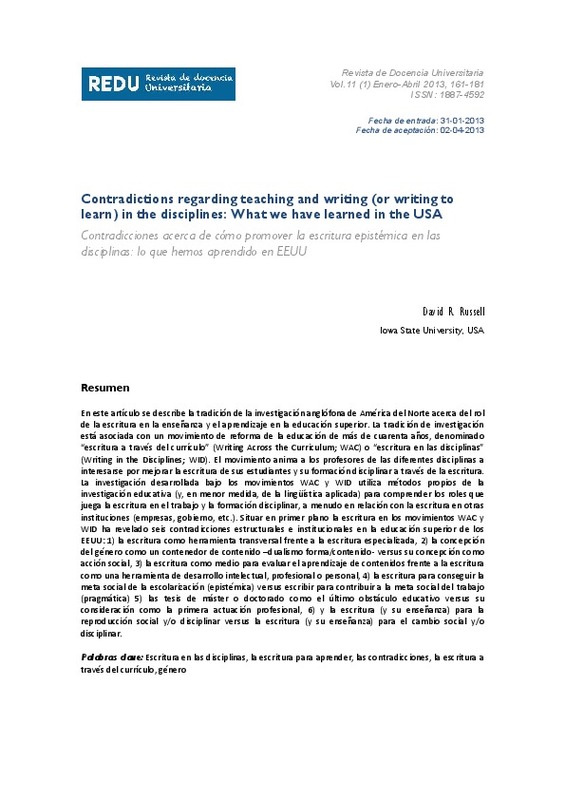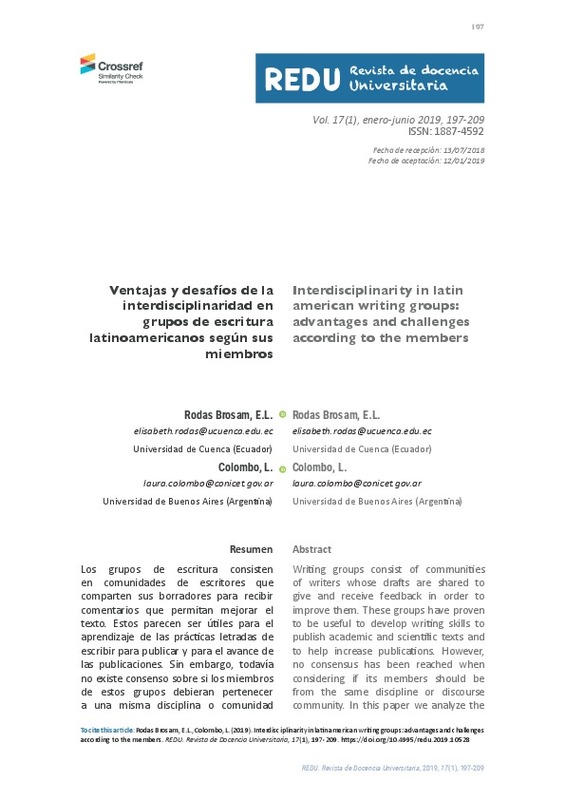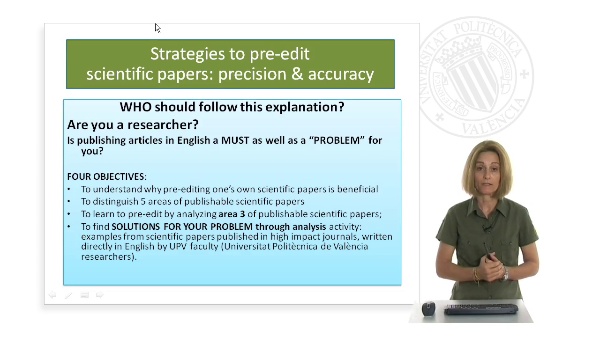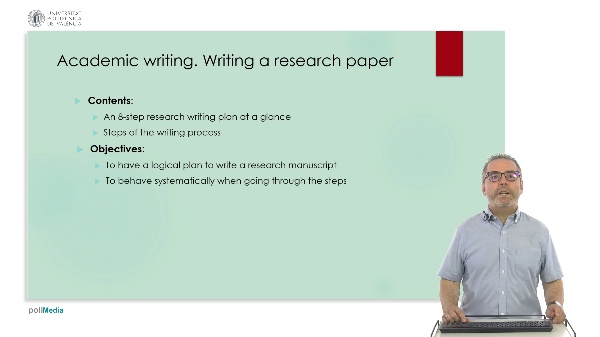Bakhtin, M. (1981). The dialogic imagination. Austin: University of Texas Press.
Bazerman, C., Simon, K., Ewing, P. and Pieng, P. (under review). Domain-Specific Cognitive Development through Writing Tasks in a Teacher Education Program
Bazerman, C. (1988). Shaping Written Knowledge. Madison: University of Wisconsin Press.
[+]
Bakhtin, M. (1981). The dialogic imagination. Austin: University of Texas Press.
Bazerman, C., Simon, K., Ewing, P. and Pieng, P. (under review). Domain-Specific Cognitive Development through Writing Tasks in a Teacher Education Program
Bazerman, C. (1988). Shaping Written Knowledge. Madison: University of Wisconsin Press.
Bazerman, C. (1992). From cultural criticism to disciplinary participation: Living with powerful words. Writing, teaching, and learning in the disciplines, 61-68.
Bazerman, C. (1994). Systems of genres and the enactment of social intentions. Genre and the new rhetoric, 79-101.
Bazerman, C. (2009). Genre and cognitive development: Beyond writing to learn. Pratiques 143/144, 127-138.
Bazerman, C. (2009). Genre and Cognitive Development: Beyond Writing to Learn. In Genre in a Changing World, Perspectives on writing (pp. 279-294). Fort Collins, Colo.: WAC Clearinghouse; West Lafayette, Ind: Parlor Press. Retrieved from a http://wac.colostate.edu/books/genre/
Bazerman, C. & Russell, D. (2003). Writing Selves/Writing Societies: Research from Activity Perspectives, Perspectives on Writing. Fort Collins, CO: WAC Clearinghouse. http://wac.colostate.edu/books/selves_societies
Bazerman, C., & Prior, P. A. (2004). What writing does and how it does it: An introduction to analyzing texts and textual practices. Lawrence Erlbaum Associates.
Bazerman, C., Joseph, L., Bethel, L., Chavkin, T., Fouquette, D., & Garufis, J. (2005). Reference Guide to Writing across the Curriculum. West Lafayette, IN: Parlor Press and The WAC Clearinghouse http://wac.colostate.edu/books/bazerman_wac/.
Beaufort, A. (1999). Writing in the real world: Making the transition from school to work. Teachers College Pr.
Beaufort, A. (2006). Writing in the professions. Research on composition: Multiple perspectives on two decades of change, 217-242.
Berger, P. L., & Luckmann, T. (2011). The social construction of reality: A treatise in the sociology of knowledge. Open Road.
Berkenkotter, C., Huckin, T. N., & Ackerman, J. (1988). Conventions, conversations, and the writer: Case study of a student in a rhetoric Ph. D. program. Research in the Teaching of English, 9-44.
Blakeslee, A. M. (1997). Activity, context, interaction, and authority: Learning to write scientific papers in situ. Journal of Business and Technical Communication, 11, 125-169.
Bowers, M. Y., & Metcalf, M. A. (2008). What employers want and what students need: Integrating business communication into undergraduate and graduate business courses. Proceedings of the 2008 Association for Business Communication Annual Convention (pp. 1-13).
Britton, J. N. (1975). The Development of Writing Abilities (11-18). London: Macmillan Education.
Carter, M. (2007). Ways of knowing, doing, and writing in the disciplines. College Composition and Communication, 58(3), 385.
Carter, M., Ferzli, M., & Wiebe, E. (2004). Teaching genre to English first-language adults: A study of the laboratory report. Research in the Teaching of English, 395-419.
Carter, M., Ferzli, M., & Wiebe, E. N. (2007). Writing to Learn by Learning to Write in the Disciplines. Journal of Business and Technical Communication, 21(3), 278.
Carter, M., Vouk, M., Gannod, G. C., Burge, J. E., Anderson, P. V., & Hoffman, M. E. (2011). Communication genres: Integrating communication into the software engineering curriculum. Software Engineering Education and Training (CSEE&T), 2011 24th IEEE-CS Conference on (pp. 21-30).
Casanave, C. P. (2002). Writing games: Multicultural case studies of academic literacy practices in higher education. Lawrence Erlbaum.
Christie, F., & Martin, J. R. (2005). Genre and institutions: Social processes in the workplace and school. Continuum Intl Pub Group.
Clark, B. R. (1989). The Academic Life. Educational Researcher, 18(5), 4.
Coe, R. M., & Freedman, A. (1998). Genre theory: Australian and North American approaches. Theorizing composition: A critical sourcebook of theory and scholarship in contemporary composition studies, 136-147.
De Vise, D. (2011, September 13). U.S. falls in global ranking of young adults who finish college. Washington Post. Washington, D.C.
Dias, P., Freedman, A., Medway, P., & Paré, A. (1999). Worlds Apart: Acting and Writing in Academic and Workplace Contexts. Mahwah, NJ: Lawrence Erlbaum Associates.
Donahue, T. (2009). Genre and disciplinary work in French didactics research. In Genre in a Changing World (pp. 424-441). Fort Collins, Colo.: WAC Clearinghouse / Parlor Press. Retrieved from http://wac.colostate.edu/books/genre/
Fisher, D. (2007). CMS-based simulations in the writing classroom: Evoking genre through game play. Computers and Composition, 24(2), 179-197.
Fisher, D. D. (2006). Remediating the professional classroom: The new rhetoric of teaching and learning. Iowa State University.
Freedman, A., Adam, C., & Smart, G. (1994). Wearing suits to class: simulating genres and simulations as genre. Written Communication, 11, 193-226.
Goswami, D., & Odell, L. (1985). Writing in Nonacademic Settings. Guilford Press.
Graves, R., Hyland, T., & Samuels, B. M. (2010). Undergraduate Writing Assignments: An Analysis of Syllabi at One Canadian College. Written Communication, 27(3), 293.
Hand, B. M. (2007). Science inquiry, argument and language: A case for the Science Writing Heuristic. Sense Pubns.
Horner, B. (2000) Terms of Work for Composition: A Materialist Critique, Albany: State University of New York Press.
Hymes, D. H. (1974). Foundations in sociolinguistics; an ethnographic approach. Philadelphia,: University of Pennsylvania Press.
Klein, P. D. (1999). Reopening inquiry into cognitive processes in writing-to-learn. Educational Psychology Review, 11, 203-270.
Kristeva, J. (1980). Desire in language: A semiotic approach to literature and art. Columbia University Press.
LeCourt, D. (1996) "WAC as Critical Pedagogy: A Third Stage?" JAC, 16: 389-405.
Leont'ev, A. N. (1981). The problem of activity in psychgology. In J. V. Wertsch (Ed.), The concept of activity in soviet psychology (pp. 40-71). Armonk, NY: M.E. Sharpe.
Leydens, J. A. & Schneider, J. (2009). Innovations in composition programs that educate engineers: Drivers, opportunities, and challenges. Journal of Engineering Education 98(3), 255-271.
Lundell, D. B., & Beach, R. (2003). Dissertation Writers' Negotiations with Competing Activity Systems. Writing Selves, Writing Societies: Research from Activity Perspectives. Eds. Charles Bazerman and David R. Russell. Fort Collins, CO: WAC Clearinghouse.
Mahala, D. (1991) "Writing Utopias: Writing Across the Curriculum and the Promise of Reform," College English, 53, 773-89.
Malinowitz, H. (1998) "A Feminist Critique of Writing in the Disciplines,"in S. Jarratt and L. Worsham (eds) Feminism and Composition Studies: In Other Words (pp. 291-312), New York: Modern Language Association of America.
McCarthy, L. P. (1987). A stranger in strange lands: A college student writing across the curriculum. Research in the Teaching of English, 233-265.
McLeod, S., & Maimon, E. (2000). Clearing the air: WAC myths and realities. College English, 573-583.
Miller, C. (1984). Genre as social action. Quarterly Journal of Speech, 70, 151-167.
Miller, C. R. (1994). Rhetorical community: The cultural basis of genre. Genre and the new rhetoric, 67-78.
NSSE (National Survey of Student Engagement). (2008). Promoting Engagement for All Students: The Imperative to Look Within. Bloomington, IN: National Survey of Student Engagement. http://nsse.iub.edu/NSSE_2008_Results
Paré, A., D. Starke-Meyerrin, & McAlpine, L. (2009). The Dissertation as Multi-Genre: Many Readers, Many Readings. Genre in a Changing World, Perspectives on Writing (pp. 179-195). West Lafayette, IN: Parlor Press and The WAC
Prior, P. A. (1998). Writing/disciplinarity: A sociohistoric account of literate activity in the academy. Mawah, N.J.: Lawrence Erlbaum.
Russell, D. (1997). Rethinking genre in school and society. Written Communication, 14(4), 504-554.
Russell, D. (2001). Where Do the Naturalistic Studies of WAC/WID Point? A Research Review. In WAC for the New Millennium: Strategies for Continuing WritingAcross-the-Curriculum Programs. Urbana, IL: NCTE.
Russell, D. R. (2002). Writing in the academic disciplines. Carbondale: Southern Illinois University Press.
Russell, D. R. (2007). Rethinking the articulation between business and technical communication and writing in the disciplines: Useful avenues for teaching and research. Journal of Business and Technical Communication, 21(3), 248.
Russell, D. R. (2009). Texts in contexts: Theorizing learning by looking at genre and activity. Rethinking Contexts for Learning and Teaching: Communities, Activites and Networks (pp. 17-30). Taylor & Francis US.
Russell, D. R. (2010). Writing in multiple contexts: Vygotskian CHAT meets the phenomenology of genre. Traditions of writing research, 353-364.
Russell, D.R., & Fisher, D. (2009). Online, multimedia case studies for professional education: Revisioning concepts of genre recognition. In J. Giltrow & D. Stein (Eds.), Genres in the Internet: Issues in the theory of genre, Pragmatics & Beyond New Series (pp. 163-191). Amsterdam Company.
Russell, D.R., & Yañez, A. (2003). "Big Picture People Rarely Become Historians": Genre Systems and the Contradictions of General Education,. Writing Selves/Writing Societies: Research from Activity Perspectives. Fort Collins, CO: The WAC Clearinghouse. Retrieved from http://wac.colostate.edu/books/selves_societies/
Schön, D. A. (1987). Educating the reflective practitioner. Jossey-Bass San Francisco. Retrieved from http://www.thecommonwealthpractice.com/reflectivepractitionerreview.pdf
Schön, D. A. (1999). The reflective practitioner (Vol. 1). Basic books. Retrieved from http://sopper.dk/speciale/arkiv/book49.pdf
Schryer, C. F. (1994). The lab vs. the clinic: Sites of competing genres. In A. Freedman & P. Medway (Eds), Genre and the new rhetoric. (105-124).
Schutz, A. (1989). The Structures of the Life-World: Alfred Schutz and Thomas Luckmann. Trans, by Richard Zaner and Tristham Englehardt. Evanston: Northwestern University Press.
Scott, M. & Lillis, T. (2008) 'Defining academic literacies research: Issues of epistemology, ideology and strategy'. Journal of Applied Linguistics, 4, pp. 5-32.
Seitz, D. (2004). Who can afford critical consciousness?: practicing a pedagogy of humility. Hampton Pr.
Slevin, J. (2001) Introducing English: Essays in the Intellectual Work of Composition. Pittsburgh: University of Pittsburgh Press.
Smart, G. (2000). Reinventing expertise: Experienced writers in the workplace encounter a new genre. Transitions: Writing in academic and workplace settings, 223-252.
Spinuzzi, C. (2003). Tracing Genres through Organizations: A Sociocultural Approach to Information Design. Cambridge, MA: The MIT Press.
Thaiss, C., & Porter, T. (2010). The state of WAC/WID in 2010: Methods and results of the US survey of the international WAC/WID mapping project. College Composition and Communication, 61(3), 534-570.
Thaiss, C., & Zawacki, T. M. (2006). Engaged writers dynamic disciplines. Engaged writers dynamic disciplines. New York: Heineman
University of Minnesota - WEC Home Page. (2013). Retrieved February 15, 2013, from http://wec.umn.edu/index.html
Vygotsky, L. (1978). Mind in society. Cambridge, MA: Harvard UP.
Vygotsky, L. (1986). Thought and Language. Cambridge, MA: MIT Press.
Walvoord, B. E. F., & National Council of Teachers of English. (1997). In the long run study of faculty in three writing-across-the-curriculum programs. Urbana, Ill.: National Council of Teachers of English.
Walvoord, B. E., & McCarthy, L. P. (1990). Thinking and Writing in College: A Naturalistic Study of Students in Four Disciplines (p. 281). Urbana, Illinois: NCTE.
Wardle, E. (2007). Understanding Transfer from FYC: Preliminary Results of a Longitudinal Study. WPA: Writing Program Administration, 31(1-2), 65-85.
Wertsch, J. V., & Wertsch, J. V. (1991). Voices of the mind: Sociocultural approach to mediated action. Harvard University Press.
[-]











